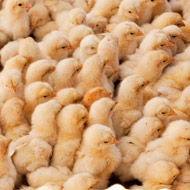Thousands of tonnes of colistin ‘shipped to farms’ in 10 countries

Timothy Walsh, a global expert on antibiotic resistance, said the use of colistin in poultry farming is “complete and utter madness”.
Nearly 3,000 tonnes of the ‘last resort’ antibiotic colistin was shipped to countries in Asia and Central America last year, for use on farms. This is according to a study by the Bureau of Investigative Journalism.
Colistin is a critically important human medicine, used to treat infections which have become resistant to nearly all other drugs. The World Health Organisation (WHO) has called for its use to be restricted in animals and banned as a growth promoter.
However, the bureau says the drug is being used on Indian farms to make animals gain weight faster, to prevent disease, and as a replacement for good biosecurity. At least five animal pharmaceutical companies in the country are said to be openly advertising products containing colistin as growth promoters.
The bureau tracked more than 2,800 tonnes of veterinary colistin that was sent to India, Vietnam, South Korea, Russia, Nepal, Guatemala, Colombia, Bolivia, Mexico and El Salvador in 2016. It is thought the true total is likely to be higher as products may be shipped under the brand name rather than being labelled colistin - and to other countries where customs data is not public.
Professor Ramanan Laxminarayan, director of the Centre for Disease Dynamics, Economics and Policy in Delhi, said farmers in India use antimicrobials - which are cheap - as a substitute for good farming practices. He believes change will be driven by consumer pressure rather than regulation.
Timothy Walsh, a global expert on antibiotic resistance, called the findings “deeply worrying” and said the use of colistin in poultry farming is “complete and utter madness”. He warned that colistin will be a “dead” drug by 2030 unless action is taken, resulting in serious, untreatable infections.
By contrast, the UK uses less than a tonne of colistin a year in agriculture. Using antibiotics as growth promoters has been banned in the EU since 2006 and was made illegal in the US last year.
Professor Walsh, of Cardiff University, was part of the team who found the colistin-resistant gene mcr-1 in Chinese pigs in 2015. The discovery prompted worldwide panic in the medical community as mcr-1 allows infections to develop colistin resistance, leading to untreatable infections.
The gene has now been detected in bacteria from animals and humans in over 30 countries across four continents. Another four colistin-resistant genes (mcr-2 to mcr-5) have since been discovered.
Professor Walsh added: “Colistin-resistant bacteria will spread on the chicken farms, in the air surrounding them, contaminate the meat, spread to the farm workers, and through their faeces flies will spread it over large distances.
“Colistin should only be used on very sick patients. Under any other circumstances it should be thought of and treated as an environmental toxin. It should be labelled as such. It should not be exported all over the world to be used in chicken feed.”



 The RCVS has announced a new version of its 1CPD mobile app, with enhanced features for veterinary surgeons and veterinary nurses to record their continuing professional development.
The RCVS has announced a new version of its 1CPD mobile app, with enhanced features for veterinary surgeons and veterinary nurses to record their continuing professional development.